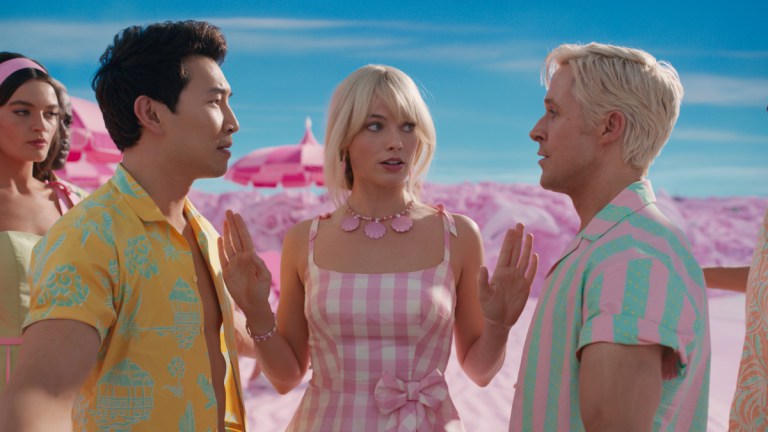Can You Take Your Kids to See Barbie?
Greta Gerwig’s Barbie is rated PG-13, but is the movie accessible to all ages? We can give you a good idea of what to expect.

This article contains some very mild Barbie spoilers.
Of all the toys in all the world, Barbie is arguably the most famous. Introduced in 1959 as a different type of doll for young girls, the Barbie brand has become globally synonymous with childhood and (for better or worse) the aspirations of generations of girls who attempt to imagine what their adulthood will be like.
For that reason, we imagine some parents are apprehensive to the fact that the first live-action, big screen Barbie movie, which stars Margot Robbie as the iconic doll, has been awarded a PG-13 by the Motion Picture Association. As per the MPA ratings board, Barbie is rated PG-13 “for suggestive references and brief language.” So if you’re a parent with young kids who want to see Barbie on the big screen… is the movie actually inappropriate for children under the age of 13?
What to Expect from Barbie
Of course it is really up to every parent to gauge what they think their children can handle, and whether that maturity matches or falls behind what the MPA deems appropriate. However, we will attempt to give you some guidance about what to expect from Greta Gerwig’s Barbie and what those “suggestive references and brief language” warnings might mean.
A good barometer to measure what to expect from the movie is at the end of one of the Barbie trailers, which you can watch here. In it, Ryan Gosling and Simu Liu, who both play variations of the Ken doll, nearly get into a fight on a beach where they insist, “I’m going to beach you off.” Robbie’s Barbie eventually intercedes and declares, “No one is going to beach anyone off!”
This is generally about the level of the suggestive humor in the film, with the language not-so-subtly suggesting a double entendre that adults will immediately recognize and chuckle at. Most children, however, will likely be oblivious as to why their parents are laughing at the words “beach off.”
With that said, there is one very on-the-nose joke about Barbie doll anatomy where, after entering the real world, Robbie’s Barbie experiences catcalling on Venice Beach. At which point, she tells several men that they should know: “I do not have a vagina.” She then adds while pointing to Ken, “And he does not have a penis.” We won’t explain the obvious joke, but we imagine some parents may not like their children hearing those lines, although they’re delivered with a singsongy innocence and naïveté.
Elsewhere in the movie, a few curse words are dropped, and at one point Barbie is introduced to the word “gynecologist.” The movie obviously does not explain what a gynecologist is, but some parents may not like having a conversation explaining it later, as Barbie saying the word is a major laugh line for the audience.
Beyond these slightly suggestive themes, we honestly imagine Barbie is anodyne for most children, who will not get any double entendres, and will no doubt love the pastel fantasia of Robbie’s life-sized Barbieland. However, the film also deals with themes of patriarchy and (lightly) considers the fears of aging and death. These do not seem inappropriate for children so much as we are not sure those themes will be fully comprehensible for the under 10-years-old age set. Yet even then, the movie is so briskly paced and full of so many sight gags and family-friendly jokes that we imagine most children will not be bored by the experience.
But it is of course up to each parent to decide for themselves.
